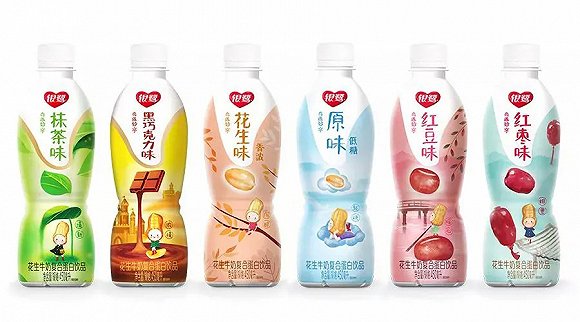Slowdown in China
It can be seen from Nestlé’s 2019 and 2020 Q1 financial reports that its rate of growth in China seems to have slowed down. In 2019, Nestlé’s total sales reached CHF 92.6 billion (about 661.44 billion yuan), up 1.2% year on year. Sales revenue from the Greater China Region was CHF 6.913 billion (about 48.121 billion yuan), showing slightly positive growth; however, overall growth was flat in 2018 [1]. According to the financial result report, the infant nutrition business in China achieved slightly positive growth, as the strong sales momentum of illume was offset by the poor performance of the S-26 range. Sales of Yinlu peanut milk and congee continued to decline.
In the first three months of 2020, Nestlé’s total sales decreased by 6.2% to CHF 20.8 billion (about 151 billion yuan) [2]. Zone AOA (Asia, Oceania, and sub-Saharan Africa) reported negative growth of -4.6%, mainly due to a double-digit sales decline in China. The declining segments included Yinlu peanut milk and canned rice porridge, Hsu Fu Chi confectionery, ready-to-drink products, and ice cream. Wyeth infant formula sales also suffered a decline, particularly the S-26 series. In contrast, infant cereals and Purina PetCare posted double-digit growth. E-commerce sales also grew by double digits, supported by Nescafé and Starbucks products. The outbreak of COVID-19 in Q1 2020 has negatively affected Nestlé’s sales in China.
Possible sale for Yinlu
In Nestlé’s Q1 sales report, it also mentioned the decision to “explore strategic options, including a potential sale of the Yinlu peanut milk and canned rice porridge businesses in China.” A 60% stake in the Chinese food company Yinlu was acquired by Nestlé in 2011 and was completely controlled by Nestlé in 2018. After the acquisition, Yinlu was also responsible for filling and distributing Nestlé’s ready-to-drink Nescafé coffee business. From 2013 to 2015, the overall revenue of Yinlu started to decline, from 11.1 billion yuan in 2013 to 9.647 billion yuan in 2015. In 2016, the company saw a double-digit decline in growth [3].

The falling growth of Yinlu peanut milk and rice porridge has been a drag on Nestlé's performance in China. The possible sale for Yinlu is being considered to “ensure the long-term growth and success of these two businesses, which had sales of CHF 700 million in 2019.” In addition, Nestlé said in the report that it would retain the ready-to-drink Nescafé coffee business, which an important driver of growth in this segment in China.
Keeping Positive on China Prospects
Despite the slowdown of the China market, Nestlé highlighted China as a strategic priority for the group. According to the 2019 financial result report, the Greater China region has become Nestlé's second-largest market, representing about 8% of global sales. The group has invested about CHF 800 million (about 5.77 billion yuan) in the Region over the past five years [4] with 31 factories, three R&D centers, and four product innovation centers under operation. In 2019, it brought nearly 200 best-selling products from 15 countries, including Switzerland, the Netherlands, the United Kingdom, and Germany to the second China international import Expo (CIIE), of which 16 products made their debut. Nestlé said in its Q1 sales report that it “continues to see significant opportunities for further investment and sustainable growth” in China.
Promising segments:
Ready-to-drink coffee
Nielsen's December 2019 report on the China retail market showed that Nestlé's had the No. 1 market share in China's ready-to-drink coffee market. Its ready-to-drink coffee products have maintained consecutive years of double-digit growth, especially the cold brew series, which are expected to reach a double-digit market share by 2020 [5]. The brilliant performance of this segment was a major deciding factor in Nestlé’s decision to retain Yinlu’s ready-to-drink coffee business.
Infant nutrition
China has become the world's largest infant nutrition market, helping Nestlé’s infant nutrition business grow at a rate of 14% in 2018, entering a high-speed growth period [6]. Nestlé has had major success in China’s high-end infant formula and baby, supplementary food segments. Its infant nutrition brand Wyeth was the No.1 in general online trade milk powder sales during the 2019 "Double 11” Shopping Festival with total sales of more than 600 million yuan. Illume, the super high-end infant formula brand owned by Wyeth, was the top-selling brand in both Tmall infant formula and baby food categories during the 2019 "Double 11" Shopping Festival. Gerber, the baby food brand owned by Nestlé, is also the brand with the biggest market share in the China market [7].
Pet food
According to the White Paper on China's Pet Industry in 2019, China's urban pet consumption market exceeded 202.4 billion yuan in 201. The pet economy in China is booming and set for continued growth. Nestlé is the third-largest brand by market share in China only after Mars and Royal Canin [8]. Its Purina PetCare has maintained a growth rate of more than 40% for four consecutive years [9] and delivered positive double-digit growth in the China market in Q1 2020.
Disclaimer: All images used in this article are from the internet.













